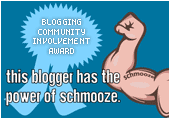Bad writer. Bad Mommy. Bad, bad, bad.
So it's 7 a.m., the child woke up early, and what am I doing? Well, what else? Reading an online novel. About zombies.
It's M.J. Rose's fault. She blogged about it. It's also David Wellington's fault. He writes so well. And it's my fault. I love reading and I love the zombie genre and I just let myself get sucked into things like this. Child? What child?
And Monster Island is part of a whole trilogy. I can foresee it now: I'll be stuck here for the next week reading this thing, and by the time I emerge, the Clifford theme song ringing in my head, I too will resemble a zombie.
And no, I'm not going to discuss the implications of a novel serialized in a blog. That would be like high school English class where the teacher took a novel you loved and picked it apart until you couldn't enjoy it anymore. No, I think M.J.'s succinct blurb was all that was needed to discuss those implications.
Five minutes to eight. Sesame Street comes on next. I'm good for another hour anyway.
It's M.J. Rose's fault. She blogged about it. It's also David Wellington's fault. He writes so well. And it's my fault. I love reading and I love the zombie genre and I just let myself get sucked into things like this. Child? What child?
And Monster Island is part of a whole trilogy. I can foresee it now: I'll be stuck here for the next week reading this thing, and by the time I emerge, the Clifford theme song ringing in my head, I too will resemble a zombie.
And no, I'm not going to discuss the implications of a novel serialized in a blog. That would be like high school English class where the teacher took a novel you loved and picked it apart until you couldn't enjoy it anymore. No, I think M.J.'s succinct blurb was all that was needed to discuss those implications.
Five minutes to eight. Sesame Street comes on next. I'm good for another hour anyway.


